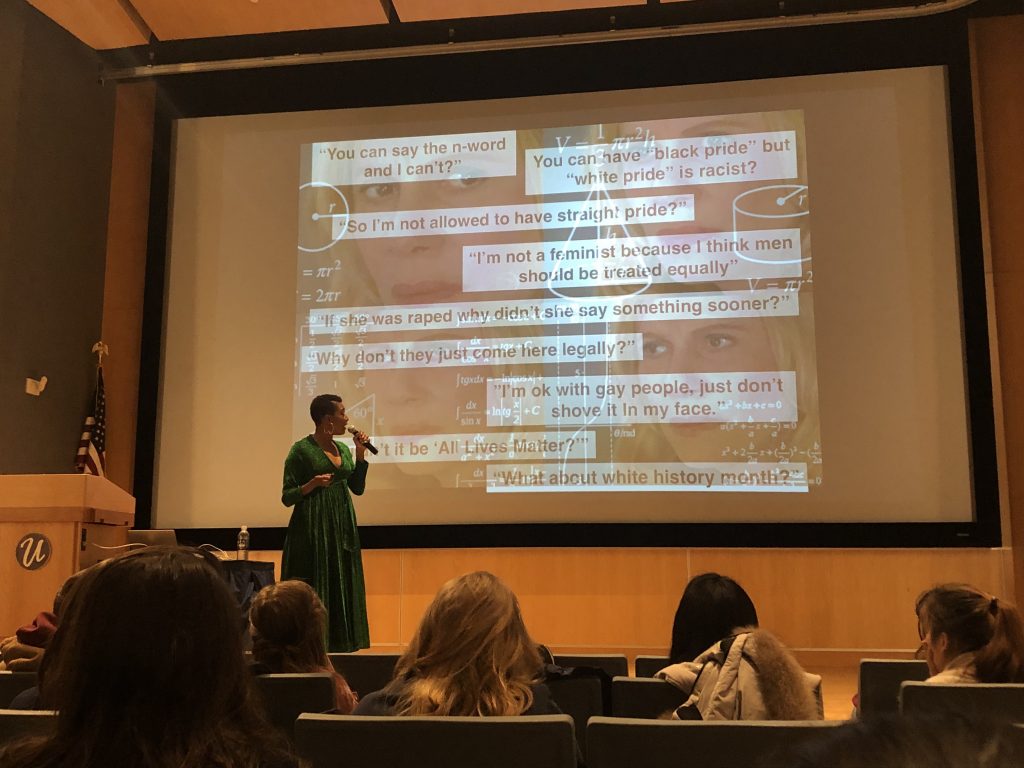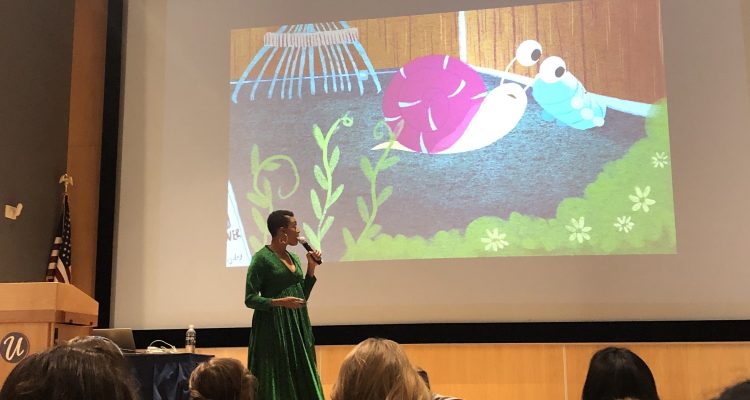On March 4, 2019, Franchesca Ramsey opened Women’s Herstory Month with a discussion on privilege and intersectionality. She began her lecture with a story called “Sometimes You’re a Caterpillar”, an extended metaphor for privilege.
“And the caterpillar was like, ‘What? How dare you. Do you know how difficult my life has been? I have twelve feet and it’s very difficult to find shoes,’ and the [snail] was like, ‘What are you talking about? I’m not saying your life isn’t difficult. I’m just saying I’m a snail and I have a shell and you don’t and that means that sometimes some things are hard for me that aren’t for you. Like I don’t know what it’s like to buy twelve shoes,'” Ramsey said.
Ramsey continued her talk by acknowledging the internet and its role in her success. She started producing her own content about her natural hair journey after seeking information only to find that there was little online for women of color.
The video that really launched her career was her 2012 “Stuff White Girls Say to Black Girls” post, garnering over twelve-million views.
The video asks questions such as, “Why isn’t there a White Entertainment Television? Is it like bad to do blackface? Is that still a thing? You can say the n-word but I can’t? How is that okay? My best friend was black. I mean she’s still black. But we’re not really friends anymore. Omigod, I’m practially black! Twinsies!”
She said that video quite literally changed her life, and she realized it was bigger than herself when appearing on Anderson Cooper. She said, “Here I was thinking that I was just making a video about my experience growing up in South Florida where I was often the only black person in a lot of spaces, but it really started a global conversation about microaggressions.”

Ramsey talks about microaggressions using common examples. She explains the interacton between two people when an unintentional comment is made using a popular meme. Photo: Shira Tall
This realization allowed her to focus her YouTube channel more on using comedy to highlight social issues rather than just hair and beauty. She then created and sold this show, “Decoded” to MTV.
She also discussed the negative side of the Internet filled with hate comments and petitions to get her fired. Ramsey vocalized, “Believe it or not, there are a lot of people on the Internet that don’t like me. Can you believe it? I can’t either. They make these petitions to try and get me fired. They saythings like cancel Decoded because it’s racist, fire Franchesca, it’s a racist show all about white shamming, I don’t know what shamming is, if the show was about black shamming, it would have been canceled…”
She also called attention to misrepresentations of Martin Luther King, Jr., Hollywood’s whitewashing of history such as the recent film “Greenbook” and the Disney classic “Pocahontas”. Her argument was when this happens, we often forget about issues of intersectionality, understanding how different issues and identities of oppression overlap.

“If your activism isn’t intersectional, it’s really not activism. You know I think we talk a lot about solidarity, we want to stand up for women. When we stand up for women we have to stand up for transwomen, we have to stand up for disabled women, we have to stand up for undocumented women, indigenous women, lesbian women, black women, white women, there are so many types of women”, she said.
Ramsey further elaborated that doing the right thing is like playing an instrument or going to the gym, it requires work, dedication, and practice.
She concluded her talk with six pieces of advice moving forward: elevate the medium, elevate the conversation, be honest about your mistakes, call out but make space to call in, acknowledge your privilege, bake your own cookies instead of looking for other’s validation, and pick your battles.

She said in choosing your battles, “there are people who want to learn, who want to be better. Those are the people you should spend time with. Not the ones who are going to play Devil’s Advocate, because of course somebody has to advocate for the devil. It’s okay to say no.”
Ramsey ended the night by quoting MLK and leaving the audience to ponder their own beliefs, actions, and identities. “So the question is not whether we will be extremists, but what kind of extremists we will be. Will we be extremists for love or for hate? Will we be extremists for the preservation of injustice or for the extension of justice?”

WHUS Radio hosted a live interview with Franchesca Ramsey on our FM broadcast. Listen to our chat with Ramsey here.


